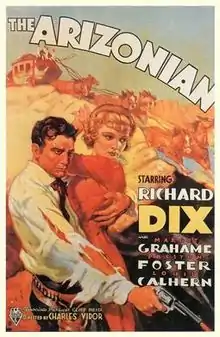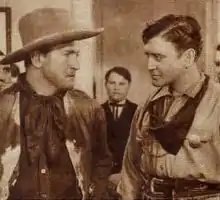The Arizonian
The Arizonian is a 1935 American western film directed by Charles Vidor and starring Richard Dix, Margot Grahame, Preston Foster, and Louis Calhern. The screenplay was by Dudley Nichols. The film was released by RKO Radio Pictures on June 28, 1935.
| The Arizonian | |
|---|---|
 Theatrical poster for the film | |
| Directed by | Charles Vidor Dewey Starkey |
| Produced by | Cliff Reid |
| Written by | Dudley Nichols |
| Starring | Richard Dix Margot Grahame Preston Foster Louis Calhern |
| Music by | Roy Webb |
| Cinematography | Harold Wenstrom |
| Edited by | Jack Hively |
Production company | RKO Pictures |
| Distributed by | RKO Radio Pictures |
Release date |
|
Running time | 75 minutes |
| Country | United States |
| Language | English |
Plot

Clay Tallant is on his way to Silver City, Arizona to meet up with his brother, Orin. As he approaches the town, he stops a stagecoach robbery being attempted by Frank McCloskey and his gang. In intervening, Clay saves Kitty Rivers, a singer in the town's saloon, who is engaged to Orin. In town, the marshal accuses McCloskey of the robbery, after which he is killed by McCloskey, who works for the sheriff, Jake Mannen. Clay is offered the job of marshal by Mayor Ed Comstoc, and accepts. As he attempts to clean up the town, he runs afoul of Mannen. Clay arrests "Shot-gun" Keeler and the rest of McCloskey's gang, but they are released by the judge, who is on Mannen's payroll. Mannen hires gunman Tex Randolph to come in and dispose of Clay, but this backfires when Randolph instead joins Clay and Orin.
Mannen sets up several ambushes in which to kill Clay, but one of them leads to Clay killing McCloskey. However, eventually Mannen traps Clay, Orin, Tex, and Pompey (their servant) in a burning building. When Pompey makes a break for it to get help, he is gunned down. The three lawmen escape the flames and shoot it out against Mannen's henchmen. When the smoke clears (literally), nearly everyone including Orin and Tex lie dead, with Clay the only one left standing. Then Mannen appears and is just about to shoot Clay when Sarah, Kitty's servant and Pompey's would-be love interest, shoots and kills Mannen.
Having cleaned up the town, Clay leaves Silver City, taking Kitty and Sarah with him. Kitty had changed her romantic interest from Orin to his Clay.
Cast
(cast list as per AFI database)*[1]
- Richard Dix as Clay Tallant
- Margot Grahame as Kitty Rivers
- Preston Foster as Tex Randolph
- Louis Calhern as Sheriff Jake Mannen
- James Bush as Orin Tallant
- Ray Mayer as Frank McCloskey
- Willie Best as Pompey
- Hattie McDaniels as Sarah[2]
- Joseph Sauers as Shot-gun Keeler
- Francis Ford as Mayor Ed Comstoc
- Ethan Laidlaw as Henchman (uncredited)
- Edward Van Sloan as Judge Cody (uncredited)
Production
The film was shot from early April to mid-May, 1935, with parts of the film shot at the RKO ranch in Encino, California.[1] Originally titled, Boom Days, towards the end of filming, the title was changed to The Arizonian.[3] By June 6, filming was completed.[4]
The film was released on June 28, 1935.[5]
Reception
The Film Daily gave The Arizonian a good review, calling it a "Western epic with historical background ...", and giving high marks to Dix's acting, Vidor's direction, and the photography of Wenstrom.[6] Motion Picture Daily, also gave the film a positive review stating, "Routine heroics in every foot make this a superior western ...". They went on to praise the acting in the film, calling it "excellent", particularly singling out Preston Foster's performance.[7] Another good review was given by the Motion Picture Herald, calling it "entertaining" and "amusing", saying that Dix was ideal in the role, and also praising Foster, Calhern, Sauers, and Mayer.[8] Motion Picture Magazine rated the film "AAA", their second highest rating (good), complimenting the plot, action, and acting.[9] Picture Play magazine stated the film was "An out and out Western that has all the essentials of the old ones, yet is more concerned with conversation and character than riding ...." They called Dix's performance "excellent", and thought Grahame's performance was admirable and interesting, although they questioned the fact that her being obviously British was never addressed in the film. While they thought the plot was standard, they felt the acting and directing elevated the level of the film.[10]
References
- "The Arizonian: Detail View". American Film Institute. Archived from the original on March 29, 2014. Retrieved September 9, 2014.
- "Arizonian, The". Photoplay. August 1935. p. 110. Retrieved August 16, 2015.
- Wilk, Ralph (May 9, 1935). "A Little from "Lots"". The Film Daily. p. 10. Retrieved August 15, 2015.
- "Coming and Going". The Film Daily. June 6, 1935. p. 10. Retrieved August 15, 2015.
- "The Release Chart: RKO". Motion Picture Herald. July 13, 1935. p. 99. Retrieved August 15, 2015.
- "Reviews of the New Films: Richard Dix in "The Arizonian"". The Film Daily. July 27, 1935. p. 4. Retrieved August 15, 2015.
- "Motion Picture Daily's Hollywood Preview: "Arizonian"". Motion Picture Daily. May 28, 1935. p. 5. Retrieved August 15, 2015.
- "The Arizonian". Motion Picture Herald. June 8, 1935. p. 76. Retrieved August 15, 2015.
- "The Arizonian". Motion Picture Magazine. September 1935. p. 12. Retrieved August 16, 2015.
- "The Arizonian". Picture Play Magazine. October 1935. p. 54. Retrieved August 16, 2015.
External links
- The Arizonian at IMDb
- The Arizonian at the TCM Movie Database